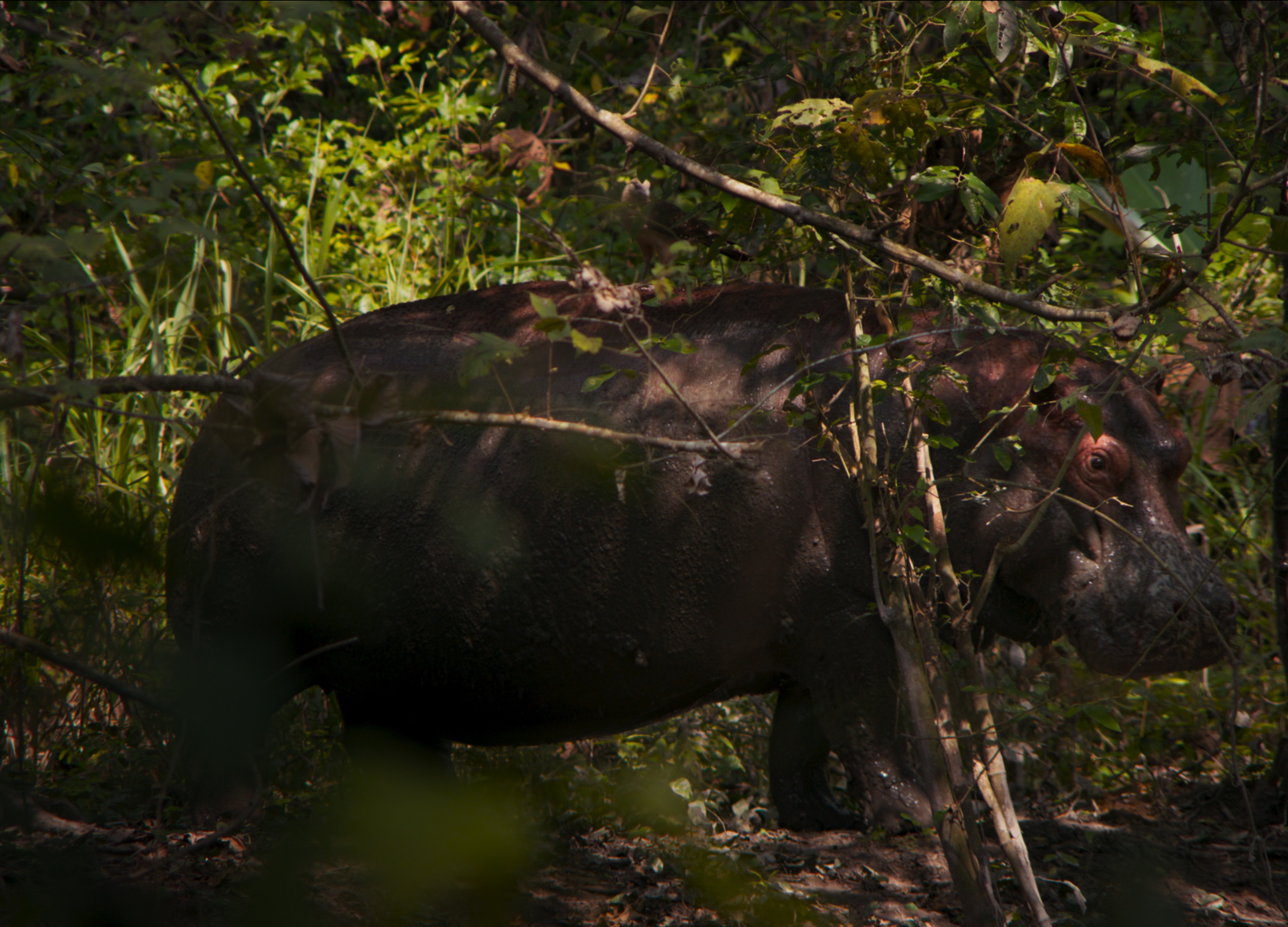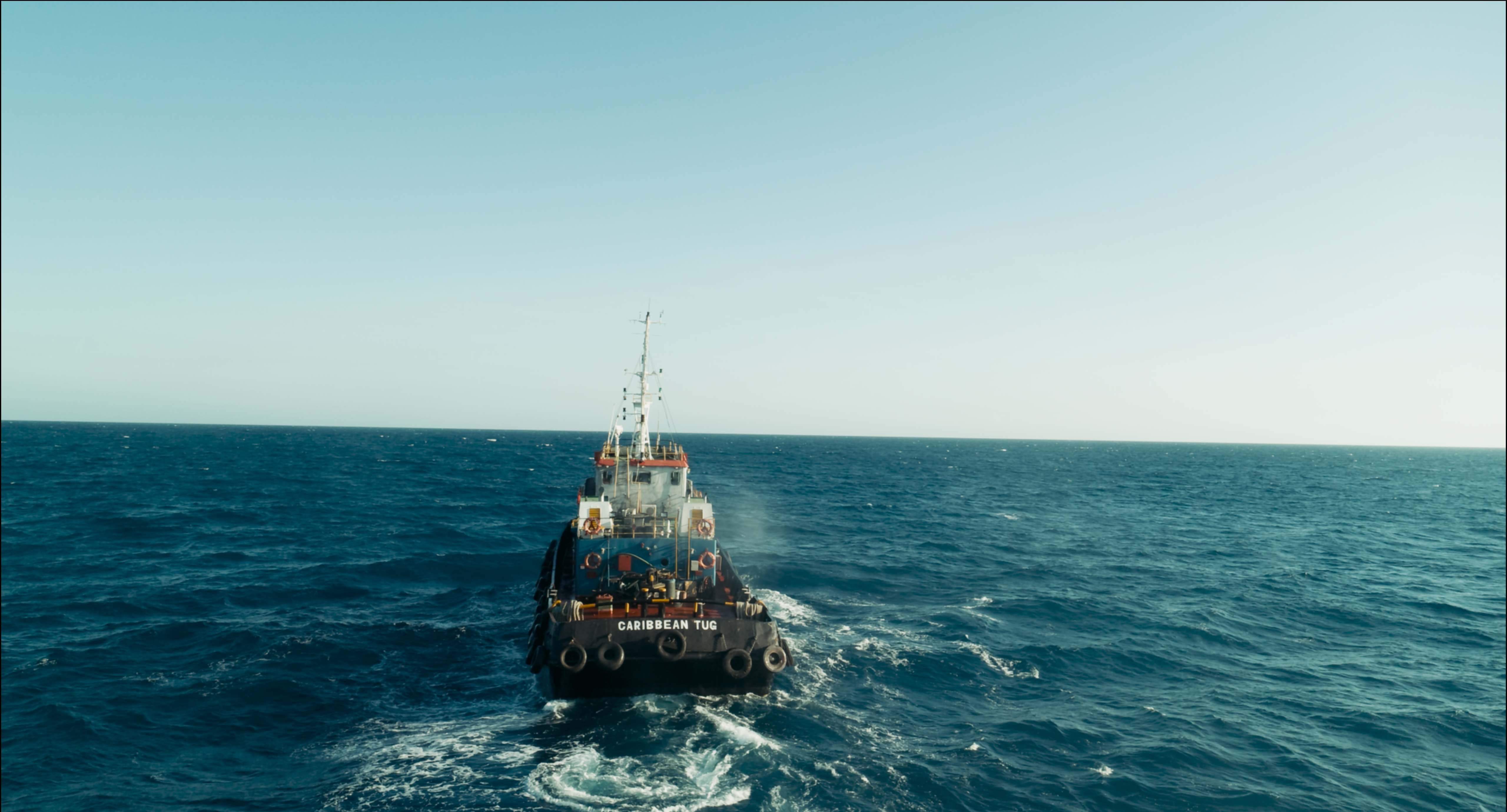Outskirts Online / Get the Print Issue / Back to Homepage
Studies on Imagination: Nelson Carlo de Los Santos’ Pepe (2024)
From Santo Domingo, an open correspondence between Julia Scrive-Loyer (Simulacro Mag) and Diego Cepeda (Outskirts Film Magazine) on Nelson Carlo de los Santos’ fourth feature film, which premiered in competition this week at the 74th edition of the Berlinale.
By Julia Scrive-Loyer and Diego Cepeda
 Pepe (Nelson Carlo de los Santos, 2024)
Pepe (Nelson Carlo de los Santos, 2024)Pepe (2024), Nelson Carlo de los Santos’ fourth feature film, premiered this week at the 74th edition of the Berlinale, the first Caribbean film to be part of the Official Competition since Strawberry and Chocolate (Fresa y Chocolate, 1994) by our beloved Tomás Gutiérrez Alea.
A voice that claims to be from a hippopotamus. A voice that doesn’t understand the perception of time. Pepe, the first and last hippo killed in the Americas, tells his story with the overwhelming orality of these towns.
Derek Walcott once said that all of the Antilles, every island, is an effort of memory, and also, that there is a territory wider than this – wider than the limits made by the map of an island: the illimitable sea and all that it remembers. Thinking about the immediate experience of watching a film like Pepe is the closest thing to remembering a childhood dream, which is why a pair of ‘two-legged’ creatures write these notes hand in hand. This is an open correspondence in Santo Domingo between Julia Scrive-Loyer (Simulacro Mag) and Diego Cepeda (Outskirts Film Magazine).
DIEGO CEPEDA: Truth or imagination? How can we begin to talk about Pepe, if not, in the first place, through dreams, intervention, or joy? A few months ago, we had the opportunity to see Cocote (2017) again, and one of the things that struck me most was the composition of the space in which it is set. Oviedo was an invented territory within Dominican geography. In Pepe, we go from Namibia, in southwest Africa, to the margins of the Magdalena River in Colombia. Although the places are not invented, they are filmed with a dream logic. The camera that is launched into the void interferes with their coordinates, makes them diffuse; the maps begin to blur, and one could say that at some point in the film, one landscape begins to imitate the other and that it is in this game of imitation, of misdirection and camouflage that the story of this ghost comes to seek us out. Likewise, the film begins with a military operation, a sound intervention in which the words are sometimes understood and sometimes reveal their condition of noise. When do the words end, and when does the music begin? — How do I know what a word is? — as we listen a few moments later. The joy of a film like Pepe rests in this undefined line, which is the place where its particular voice is born.
JULIA SCRIVE-LOYER: I love the idea of Pepe’s ghost coming to find us. I think that what I find particularly moving about the movie is how playful and unlikely it is. It approaches childhood’s imagination by creating and transforming through words. Throughout history, the power of words has often been used dangerously and harmfully, but here, this power manifests itself in a beautiful way – using words to try to understand and describe the unknown and, therefore, create new images and new meanings. On one side, there is the speech Pepe builds with these words – the surprise of those sounds coming out of his mouth – which allows him to tell his story. And when Pepe stays silent, and we stay with the inhabitants of the Magdalena River, their words transform him, and we enter something much more magical than a talking hippo. We sail through the myths and transformations of Pepe, from a log to a caiman, a shadow that gazes at his reflection in a cartoon. That dialogue between the stranger and the worlds it visits allows us to see that world in a new light: the oddness of a funeral filled with cumbia, the queens of the river arriving at the beauty pageant in their flowery boats, the makeshift taxi on the old train tracks. Everyday life becomes unbelievable when seen through the eyes of Pepe, who looks at them from afar. Then there’s the audiovisual language, the film’s fabric, which, as you said, transforms coordinates, makes two rivers rhyme, turns words into sound and sounds into music. And finally, there are the languages Pepe speaks, their particular phonemes and syntax that vary depending on what he’s trying to express, the origin of the feeling he has at any given moment, the physical reminder of someone else’s memories… What is owned and what is not in the body of the displaced? In that last and fatal encounter, Pepe talks to us and to his murderers. He talks to them in their languages, and there’s dignity in that personification; it becomes a battle of equals, a painful and horizontal gaze, which finally rises to the sky, returning us to childhood, to impossible images, to a bittersweet infinity.
CEPEDA: It is a film in which history dances and dismantles, in which the world is illuminated, as you say, thanks to the creative insistence between word and vision. Pepe stands halfway between two ‘opposing’ fronts in the history of experimental cinema. David Gatten summed them up as follows: Stan Brakhage thinks that naming things prevents seeing; Hollis Frampton thinks that naming things is what makes it possible to see. The freedom in Pepe — both of the character and of the film — is to escape language, to get away from the roads we have already travelled as hunters, with our guns and our cameras, with our interpretations and metaphors. To escape, even, from the place of enunciation. — I don't remember how I was told this story, perhaps through the eyes of another, or maybe I saw it in the scars of an elder. — This ghost speaks to us, but what makes it speak? The whole film could be thought of as the manifestation of a tale that wanders in search of its narrator and its listener, a tale that wants to intervene in the heart of history, moving from one character to another, from Pepe to Betania, or from Candelario to the German hunter. It is a circular story that relates violence with the absurd, rebellion with affection and difference with freedom.
SCRIVE-LOYER: ‘The whole film could be thought of as the manifestation of a tale that wanders in search of its narrator and its listener’. I want to focus on this, not only because I agree, but because I love, while listening to and reading reviews of Pepe, some people’s bewilderment at the part of the movie where Pepe ‘disappears’ to give way to ‘fiction’. Some are upset by this change, unhappy, betrayed, even… Where is Pepe? And why is he so quiet? Nevertheless, Pepe is there, the narrator is present; he just stopped talking and is now observing. Speaking in strictly emotional terms, the moment that closes the part of the ‘quiet Pepe’, the last time we see him alive before we hear the news of his death, moves me deeply. In a bird’s-eye shot, Pepe and what I assume is his mate stand quietly in the river until one of them swims away, and Pepe is left alone. The magic of cinema exists, and this shot is irrefutable proof of it because, at that moment, even though I can’t hear him, I know Pepe is thinking. Making an – albeit uncalled-for – reference to The Departed (2006), which was screened in Berlin on the same day as Pepe’s premiere, I can feel him like Martin Sheen smoking one final cigarette as he waits for his murderers to step out of the elevator. A last moment of lonely dignity, a last quiet moment. If, for some, the rest of the movie didn’t show how lovingly it was made, this moment alone would make it clear. Pepe weaves the film’s syntax and, from that flying ship he has now become, eternal and harmless, he observes us and observes himself. He travels to places he has only heard of in tales, a personal and uncertain mythology, to try to understand where he came from, where he lived, and what for. In the end, isn’t it beautiful that we, as viewers, beg for a hippo to keep talking to us?
CEPEDA: I want to end with a quote from a 1994 lecture by Tomás Gutiérrez Alea, called ‘Another Cinema, Another World, Another Society’ that resonates with this mysterious voice speaking in Afrikaans, Mbukushu and Spanish: ‘Indeed, we all speak - literally and metaphorically - the language of our respective colonisers, and sooner or later what happened to Caliban in ‘The Tempest’ happens to all of us; when we wish to think and speak on our own, without intermediaries, a cry comes out: the first thing we express is our indignation. ‘You taught me language,’ says Caliban to Prospero — ‘and my profit on ‘t / Is I know how to curse: The red plague rid you / For learning me your language!’
